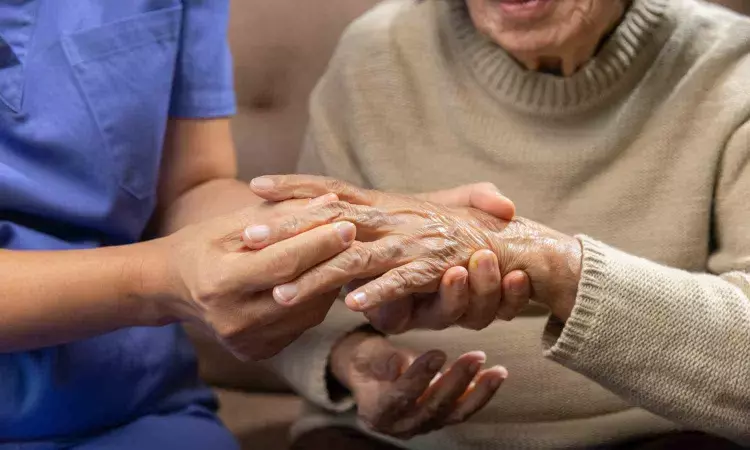- Home
- Medical news & Guidelines
- Anesthesiology
- Cardiology and CTVS
- Critical Care
- Dentistry
- Dermatology
- Diabetes and Endocrinology
- ENT
- Gastroenterology
- Medicine
- Nephrology
- Neurology
- Obstretics-Gynaecology
- Oncology
- Ophthalmology
- Orthopaedics
- Pediatrics-Neonatology
- Psychiatry
- Pulmonology
- Radiology
- Surgery
- Urology
- Laboratory Medicine
- Diet
- Nursing
- Paramedical
- Physiotherapy
- Health news
- Fact Check
- Bone Health Fact Check
- Brain Health Fact Check
- Cancer Related Fact Check
- Child Care Fact Check
- Dental and oral health fact check
- Diabetes and metabolic health fact check
- Diet and Nutrition Fact Check
- Eye and ENT Care Fact Check
- Fitness fact check
- Gut health fact check
- Heart health fact check
- Kidney health fact check
- Medical education fact check
- Men's health fact check
- Respiratory fact check
- Skin and hair care fact check
- Vaccine and Immunization fact check
- Women's health fact check
- AYUSH
- State News
- Andaman and Nicobar Islands
- Andhra Pradesh
- Arunachal Pradesh
- Assam
- Bihar
- Chandigarh
- Chattisgarh
- Dadra and Nagar Haveli
- Daman and Diu
- Delhi
- Goa
- Gujarat
- Haryana
- Himachal Pradesh
- Jammu & Kashmir
- Jharkhand
- Karnataka
- Kerala
- Ladakh
- Lakshadweep
- Madhya Pradesh
- Maharashtra
- Manipur
- Meghalaya
- Mizoram
- Nagaland
- Odisha
- Puducherry
- Punjab
- Rajasthan
- Sikkim
- Tamil Nadu
- Telangana
- Tripura
- Uttar Pradesh
- Uttrakhand
- West Bengal
- Medical Education
- Industry
Case Study Demonstrates Viability of Surgical Reconstruction for Vaughan-Jackson Syndrome

India: A recent case study has highlighted the successful surgical approach for the management of Vaughan-Jackson syndrome.
The case showcases that surgical intervention, including techniques like distal ulna resection, ECU tendon stabilization, and tendon transfer, can effectively address the functional limitations caused by Vaughan-Jackson syndrome. The case study is scheduled for publication in the Oct-Dec 2024 issue of Apollo Medicine and is available online ahead of its print release.
Vaughan-Jackson syndrome is described as a gradual rupture of the extensor tendons resulting from tendon attrition at the wrist. Rheumatoid arthritis and osteoarthritis are commonly linked to it. Vaughan-Jackson syndrome causes significant functional impairment and negatively impacts the quality of life and functional impairment.
“The development of the extensor tendon reconstruction treatment plan was likely prompted by the need to address the specific challenges posed by Vaughan-Jackson syndrome. The combination of tendon rupture, joint involvement, and ulnar head prominence requires a comprehensive surgical approach,” the lead author Dr J Terrence Jose Jerome, Department of Orthopedics, Hand, and Reconstructive Microsurgery, Olympia Hospital & Research Centre, Trichy, Tamil Nadu, told Medical Dialogues.
Furthermore, he added that “The significance of the case report lies in its contribution to the limited literature on Vaughan-Jackson syndrome, offering valuable insights for clinicians managing this complex condition.”
Due to the lack of established treatment guidelines for this rare condition, it is necessary to explore and refine surgical techniques. Therefore, Dr Jose Jerome and colleagues aimed to showcase a successful surgical technique in patients presenting with Vaughan-Jackson Syndrome.
In patients, Vaughn-Jackson lesion was indicated by the radiological scalloping sign and was confirmed through surgical observations, including tenosynovitis of the extensor tendons, tendon thinning, synovitis of the distal radioulnar joint (DRUJ), and ruptures of the ulnar extensor tendons.
For the surgery informed consent was taken from all the patients, and surgical interventions including distal ulna resection, dorsal tenosynovectomy, and reconstruction of extensor tendon rupture were performed successfully in patients.
After surgery, the patient was immobilized with a wrist splint for 4 weeks. Once the splint is removed, a therapy program that includes both passive and active-assisted exercises for the fingers and wrist extensors begins. Night splints were used for another 2 weeks. By the sixth week post-surgery, the patient is allowed full range of motion and no longer needs splinting.
For the assessment of outcomes simplified scoring system, adapted from the authors' Radial Nerve Palsy Tendon Transfer Outcome Score was employed. The DASH score was also utilized to evaluate the overall functional result.
In the case report, the author concluded that surgical management should be considered a viable option for patients with Vaughan-Jackson syndrome. By addressing tendon rupture, joint instability, and ulnar prominence, surgery can improve hand function and quality of life. This has implications for clinical practice, encouraging clinicians to consider surgical intervention when appropriate.
“Alternative treatment options for Vaughan-Jackson syndrome are limited. While non-surgical approaches like splinting and medication may provide temporary relief, they do not address the underlying structural issues,” said the lead author Dr Jose Jerome.
Reference: Jerome JTJ, Karunanithi D. Extensor Tendon Reconstruction in Vaughan–Jackson Syndrome: Surgical Technique and a Case Illustration. Apollo Medicine. 2024;0(0). doi:10.1177/09760016241259845
BDS, MDS(orthodontics)
Dr. Garima Soni holds a BDS (Bachelor of Dental Surgery) from Government Dental College, Raipur, Chhattisgarh, and an MDS (Master of Dental Surgery) specializing in Orthodontics and Dentofacial Orthopedics from Maitri College of Dentistry and Research Centre. At medical dialogues she focuses on dental news and dental and medical fact checks against medical/dental mis/disinformation
Dr Kamal Kant Kohli-MBBS, DTCD- a chest specialist with more than 30 years of practice and a flair for writing clinical articles, Dr Kamal Kant Kohli joined Medical Dialogues as a Chief Editor of Medical News. Besides writing articles, as an editor, he proofreads and verifies all the medical content published on Medical Dialogues including those coming from journals, studies,medical conferences,guidelines etc. Email: drkohli@medicaldialogues.in. Contact no. 011-43720751


